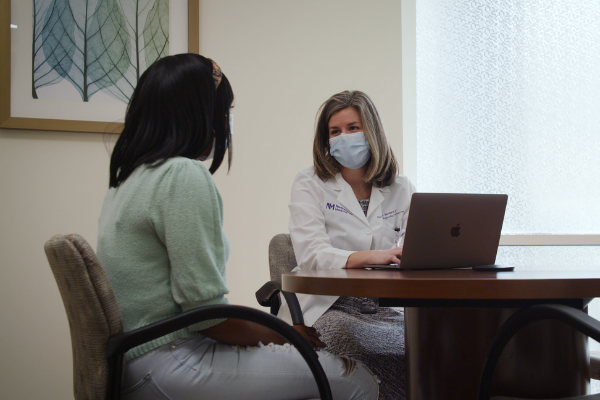Pre-Treatment
|
The board-certified physicians at Northwestern Medicine Center for Fertility and Reproductive Medicine offer innovative, effective solutions for a wide range of conditions.
Pre-treatment tests offered include: Ovarian Reserve Tests
Ovarian reserve is an estimate of the remaining supply of eggs in the ovary. Ovarian reserve tests aim to measure both the number of eggs that can be harvested in a single month as well as measure the overall egg supply within the ovary. Four different tests are often performed together:
Infertility is a clinical diagnosis that can only be made in women who have been attempting conception without success for one year prior to age 35 or six months after age 35. Ovarian reserve screening can indicate egg quantity but cannot predict infertility, nor can it predict the time it would take to achieve pregnancy or the likelihood of success with fertility treatments. AMH testing can indicate the size of the remaining pool of eggs in the ovary and may be used to help guide decisions about your fertility treatments. Other Pre-Treatment Tests
Hysterosalpingogram (HSG) and Saline infusion sonohysterogram (SIS) A hysterosalpingogram (HSG) is an X-ray that visualizes the uterus and fallopian tubes. The test is performed in hospital outpatient radiology. A saline infusion sonohysterogram (SIS) is an ultrasound that visualizes the uterus and fallopian tubes. The test is performed in the office by a physician or nurse practitioner. Both tests are usually performed a few days after the end of your menstrual period and prior to ovulation. For most women, the test will occur between Day 5 and Day 11 of your cycle. The information from this test will help your physician determine the condition of your uterus and fallopian tubes. Preparing for the test Please call the office on Cycle Day 1 (first day of a full menstrual flow) to make your appointment for the HSG and/or the SIS. If Cycle Day 1 is a Saturday or Sunday, please call on Monday morning. As a group practice, the physician or nurse practitioner may be different than your primary provider. Most women experience mild to moderate cramping during these procedures. It is recommended to take 600 mg of ibuprofen one hour prior to the procedure to ease any discomfort. Arrive with a full bladder. You will be asked to provide a urine sample. What to expect during the test The radiology staff will assist you to the procedure area, where you will be asked to change into a gown and collect a urine sample. The tests begin the same as a routine gynecological exam. A speculum is inserted into the vagina so the cervix can be visualized. For the HSG test, a narrow tube (cannula) is inserted into the opening of the cervix, and contrast solution is injected into the uterus. You will likely feel cramping and discomfort as the solution is injected. Take slow deep breaths to help relax. As the solution is injected, the radiologist takes a series of X-ray pictures. When the procedure is complete, the cannula is removed. For the SIS test, a narrow tube (cannula) is inserted into the opening of the cervix. The speculum is removed and the ultrasound probe is inserted into the uterus. As saline solution is injected into the uterus, you may feel cramping and discomfort. Take slow deep breaths to help relax. As the solution is injected, the practitioner takes a series of sonographic pictures. When the procedure is complete, the cannula is removed. After the test It is normal to experience cramping and discomfort after the procedure. These symptoms should decrease over the 12 to 24 hours after the procedure. Lying flat may help. Slight bleeding or spotting is normal for a few days following the HSG and SIS. Please notify your physician if you experience heavy vaginal bleeding, bleeding that continues longer than one week, severe cramping, or a temperature greater than 100.5 degrees F. You may resume most normal activities. The physician or nurse practitioner will discuss the results of the test with you. Do not hesitate to ask questions at any time during the procedure should you have any concerns, need help or require further explanation. At your next appointment, your physician will discuss the implications of the test results on your treatment plan. Genetic Carrier Screening
Northwestern Medicine Center for Fertility and Reproductive Medicine offers screening to determine whether you are a carrier for genetic mutations. What it means to be a carrier A gene is a piece of DNA that is responsible for an inherited trait. Each of us inherits two genes for each trait, one from our mother and one from our father. All of the genetic diseases in this screening program are inherited the same way. If you inherit only one gene with a change or mutation for the disease, you are merely a “carrier,” meaning that you have the gene with the mutation and can pass it on to your children, but it does not affect your health. If you inherit one gene from each parent for the same disease (two copies of the gene with a mutation for the disease), you do not have a normal functioning copy of the gene; this means you have the disease. Since carriers are healthy, the only way to detect a carrier is through screening. Carriers usually do not have a family history (since it needs to come from both sides of the family). When we discuss the chances of carrying the gene for a particular disease, we assume you do not have a family history. If you do have a family history, you actually have a higher chance of carrying the gene than the general population. It is important to discuss your family history with your physician. How screening is done The screening is done through a simple blood test. There are no special preparations needed. If you elect screening, you will be asked to complete a requisition and consent form. A blood sample will then be drawn. Results are generally available within two weeks and will be given to you by telephone. Ideally, it is recommended that you have a carrier screening prior to pregnancy. Understanding your results For the diseases that use DNA screening, the laboratory looks for the most common mutations, or changes, in the gene. No further testing would be recommended if your results are negative. Since carrier screening does not cover all mutations causing disease, this does not mean you are not a carrier. It does, however, mean your chance of being a carrier has been significantly reduced. If you are found to have a mutation, this means you are a carrier of the disease. If the person contributing sperm has not already been screened, this would be recommended as soon as possible. If you and the person contributing sperm are found to be a carrier for the same mutations, your physician will refer you to a genetic counselor to further discuss potential risks for future pregnancies/children. |
To Request an Appointment
Northwestern Medicine Fertility Center is now conveniently located in four locations: Chicago, Geneva, Highland Park, and Oakbrook Terrace. Visit our Locations & Appointments page for more information. LGBTQ FAMILY OPTIONS
Our faculty and staff provide an inclusive and supportive environment for all patients undergoing fertility treatment, regardless of gender, sexual orientation or marital status. RECURRENT PREGNANCY LOSS CLINIC
Recurrent pregnancy loss can be physically and emotionally difficult. At the Northwestern Medicine Recurrent Pregnancy Loss Clinic, we help people become parents by offering comprehensive care that addresses both their medical and psychological needs. |



